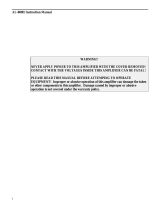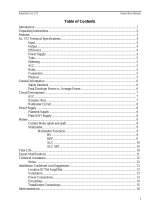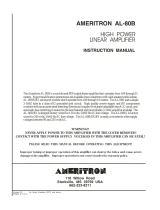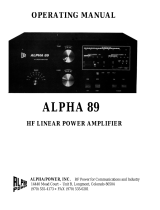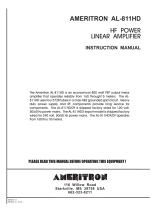Page is loading ...

COMMANDER II
2 METER VHF LINEAR AMPLIFIER
—————————————————————
Owner’s Manual
PALSTAR, INC.
Command Technologies Division
9676 N. Looney Road
Piqua, Ohio 45356
U.S.A.
Customer Service and Sales Telephone: 800-773-7931
Fax: 937-773-8003
E-mail: [email protected]

2
Table of Contents
Introduction 3
Inside View 4
Specifications 5
Unpacking Instructions 6
HV Transformer Installation 6-8
Safety Warnings and Precautions 9
Front & Rear Layout 10
Installation Preparation 11
Operating Procedure 12
Operating Hints 13
Typical Operating Conditions Table 13
Warranty, Service, and Returns 14
RF Deck Schematic 15
Control and Bias Board Schematic 16
High Voltage Power Supply Schematic 17

3
INTRODUCTION
The Commander II is a grounded grid class AB2 linear power amplifier that operates
on the Amateur 2 meter band (144 to 148 MHz).
A single CPI/Eimac 3CPX800A7 pulse-rated external anode triode with forced air
cooling and modern stripline circuitry ensures efficient and conservative operation.
The 6:1 ratio vernier reduction drives on all tuning controls allow smooth and easy
tune up, while the front panel input tuning control allows a higher input circuit "Q" for
excellent linearity and to present a low input VSWR to the exciter all across the entire 2
meter band.
An automatic delay circuit, for proper cathode conditioning before RF drive can be
applied, extends tube life. A 200 ohm resistor in the plate supply negative lead protects
the tube in the event of an arc.
The Commander II features a full compliment of control and metering functions for
easy on-air operation.
A dual primary power transformer allows 117VAC, 200VAC or 234VAC operation.

4
High Voltage
Transformer
T/R Relay
Board
Cooling
Blower
Load Tuning
Capacitor
Input Tuning
Piston Capacitor
Multimeter
Switch
3CPX800A7
Triode Tube
Filament
Transformer
High Voltage
Interlock
Switch
Control
Board
Multimeter
High Voltage
Board
(underneath)
Commander II Inside Layout

5
Specifications
Commander II
2 Meter VHF Linear Power Amplifier
• Frequency Range: 144 to 148 MHz.
• Modes: USB, LSB, RTTY, FM, CW.
• Power Requirements: 117/200/234VAC 50/60 Hz.
• RF Drive Power: 10 to 15 Watts nominal; 30 Watts maximum, for full 1 KW (CW) output.
• RF Output: +15db gain; > 650 Watts (USB, LSB); 450 Watts maximum. (FM or RTTY).
• Input Impedance: 50 Ohms unbalanced, front panel adjustable.
• Output Impedance: 50 Ohms nominal.
• Antenna Load (VSWR): 2:1 maximum.
• Harmonic Suppression: better than 60db down at rated output.
• Intermodulation Distortion: better than 35 dB down at rated output.
• Weight (with transformer): 60 lbs. (27.3 Kg).
• Cabinet Size: 14.5'' x 14.5'' x 6'' (36.8cm x 36.8 cm x 15.2 cm).
• Tube Compliment: one 3CPX800A7 ceramic metal triode.
• Cooling: pressurized chassis forced air.
• Antenna Relay: DPDT; .1 dB insertion loss.
• Fuse: Type SFE; 234VAC and 200VAC operation: 15 Amp; 117VAC operation: 30 Amp.

6
UNPACKING INSTRUCTIONS
Carefully remove your Commander II from its shipping carton making sure there is no dam-
age evident from shipping. If there is any damage, notify the delivering shipper immediately,
fully describing the damage.
Do not destroy the packing material, since it may be reusable later, should you require fac-
tory service, or need to transport the Amplifier for any other reason.
TRANSFORMER INSTALLATION
Due to its weight, the power transformer is shipped separately to prevent damage to the am-
plifier cabinet, and it must be installed by purchaser.
In order to install the HV transformer, both the top and bottom covers amplifier covers must
be removed. The small plastic bag (shipped with amplifier) contains the transformer mounting
hardware.
The following photographs illustrate the proper HV transformer installation:
This is the area the transformer
mounts in. Pay attention to the
wiring harness (1) at the rear and
be careful not to pinch any of the
wiring under transformer during
installation. Note that the con-
nector (2) has been moved to the
side, out of the way
Position the HV transformer with
the wires and connector as
shown.
1
2

7
Lift the HV transformer and tilt
it as shown in the picture. Gently
lower the transformer until the
side with the connector is resting
on the amplifier chassis.
Make sure that none of the wir-
ing is pinched under the trans-
former.
While supporting the raised side of
the transformer, gently lower it in
place until it, too, is resting on the
chassis. The large opening in the
side of the chassis allows access to
do this.
The transformer is now in place
and can be fastened to the chassis.
Insert the provided carriage bolts
in from the top, through the trans-
former mounting tabs and chassis
slots. Next, slightly lift the chas-
sis and place a flat washer and
KEPS nut on the bottom side of
each bolt and tighten.
Caution: before tightening,
be sure that none of the wir-
ing harness is pinched under
the transformer!

8
Be sure to read the safety cautions
on the next page before operating!
Plug the connector on the trans-
former into the one on the wiring
harness. It is keyed so that it
cannot be plugged in backwards.
Make sure that the connector
halves are pressed together until
the lock tabs snap in place.
Dress the wiring down out of the
way, as shown. Re-install the
top and bottom covers and the
unit is ready for use.

9
CAUTIONS:
• DO NOT attempt any type of service or repair on this amplifier without first removing the
AC power and allowing AT LEAST 60 MINUTES FOR THE HIGH VOLTAGE CAPACI-
TORS TO BLEED OFF !
• DO NOT operate this amplifier with the top or bottom covers removed. DO NOT operate
this amplifier with the internal RF tube compartment covers removed. Never place any ob-
jects into the top ventilation holes. CONTACT WITH VOLTAGES IN THE CABINET
CAN BE FATAL ! CLOSE QUARTERS EXPOSURE TO UNSHIELDED RF AT THESE
POWER LEVELS IS HAZARDOUS TO YOUR HEALTH !
• Never attempt operation without first connecting an appropriate antenna (2:1 VSWR Max)
or a 50 ohm dummy load with sufficient rating or SERIOUS DAMAGE TO THE AMPLI-
FIER MAY RESULT.
• Never operate the amplifier with more drive than required to produce the rated output for
the operating mode used.
• Do not place the Commander II in repeater operation. This amplifier is not designed for un-
attended service. Extensive modification would be required for this type of service.
• Never operate any amplifier using an extension cord.
• Never cover the top of the amplifier cabinet with books, papers or other equipment as
OVERHEATING MAY RESULT.
IF ANY SITUATION YOU ARE NOT SURE ABOUT OCCURS,
PLEASE CONTACT MANUFACTURER FOR ASSISTANCE.
Telephone: 800-773-7931
Fax: 937-773-8003
E-mail: info@palstar.com
!! WARNING !!
CONTACT WITH VOLTAGES IN THIS AMPLIFIER CAN BE
!!! FATAL!!!

10
Ground Lug
Multimeter TUNE Control
Multi-turn Piston Capacitor
Preset at Factory—
do not adjust, see pages 12 & 13
Multimeter
Selector
Switch
LOAD
Control
INPUT
Control
STANDBY/
OPERATE
Switch
ON/OFF
Switch
Power Ready
Light
Voltage Selection
Jumper Cover
RF In RF Out
Operate Enable
Connector
Rear Panel Layout
Front Panel Layout
Fuse Post Accessory
Power

11
INSTALLATION PREPARATION
The Commander II is factory wired for operation from an 234VAC line. Operation at the full
rated output should not be attempted unless this line is capable of supplying at least 15 amps of
peak current. It is strongly recommended that you operate this amplifier from a 234VAC line.
The amplifier may be operated from a 117VAC power source capable of supplying at least 30
Amperes.
To configure the amplifier for 117VAC or 200VAC operation, remove the voltage selection
jumper cover on the rear panel of the amplifier and install appropriate jumpers (see illustration
below). CAUTION.... BE SURE YOU HAVE REMOVED THE LINE CORD PLUG FROM
YOUR WALL SOCKET BEFORE REMOVING THE JUMPER COVER. IF YOU FAIL TO
UNPLUG YOUR AMPLIFIER, YOU WILL EXPOSE YOURSELF TO LETHAL VOLT-
AGES. Install an appropriate plug on the power cord to mate with your wall receptacle.
If you change the operating voltage as described above, be sure to install the proper fuse.
The fuse is a type SFE, 15 Amp for 234 VAC & 200 VAC operation, 30 Amp for 117 VAC op-
eration
All Commander II amplifiers manufactured for export are wired for 200 or 234VAC, 50 or
60 Hz, depending on the final destination. No plug is supplied.
Location of your Commander II requires that no equipment be placed directly above it, as air
expelled from the tube exhaust can become quite hot. Allow at least 3 inches clearance on either
side of the unit and between other equipment. Extending the tilt bail located on the bottom of
the chassis improves the cooling airflow.
To switch from transmit to receive the Commander II requires a contact closure or keying
circuit capable of sinking 55ma of positive voltage (12 VDC open circuit) to ground. This con-
nection is made to the RCA jack on the rear panel marked RELAY. Read the manual that came
with your transceiver to determine the proper external connections. On some transceivers, this
is not provided, and an alternate circuit will be required. Always use shielded cable for these
connections.
Connect a good quality thruline Wattmeter between the amplifier output jack and the an-
tenna or dummy load using RG8 or better coax.
Connect the exciter (transceiver) RF output to the amplifier input using 50 ohm coax.
Connect a ground lead, as short as possible, from earth ground to the Commander II’s rear
panel ground terminal.

12
OPERATING PROCEDURE
After reading this manual and completing the Installation/Preparation Instructions, position
the Commander II front panel controls as follows:
• ON/OFF — OFF
• OPERATE/SSTANDBY — STANDBY
• MULTIMETER SWITCH — Vp (PLATE VOLTAGE)
• INPUT — CENTER ON SCALE
• LOAD — MINIMUM (COUNTER-CLOCKWISE)
• TUNE — LEAVE AT FACTORY SETTING (NOTE: the TUNE control is a multi-turn
piston capacitor and was factory preset for operation at 144.200 MHz. See page 13 for more
information.)
After presetting these controls, switch the ON/OFF switch to the ON position. The meter
lamps will illuminate, the blower will be running and plate voltage will be approximately 2700
VDC.
The 3CPX800A7 used in this amplifier requires a warm up period before RF drive may be
applied, to prevent damage to the tube. A 2 minute warm up is provided by a solid state timer
circuit. At the end of the warm up period, the green POWER LED on the front panel illuminates
and the unit is ready for operation.
Switch the meter switch to the Ip (plate current) position.
Switch the OPERATE/STANDBY switch to the OPERATE position and key the exciter with
ZERO RF drive applied. The Red Transmit light should illuminate, the tube will be biased
“on”, and plate idling current should approximately 80 ma. as displayed on the Ip meter.
Apply a very low RF drive (less that 5 watts) and adjust the INPUT control for a peak in the
plate current (Ip) on the meter. Next adjust the TUNE control for maximum output as indicated
on an external Wattmeter. DO NOT adjust the LOAD control at this time. COMPLETE
THESE ADJUSTMENTS AS QUICKLY AS POSSIBLE TO AVOID STRESSING THE
TUBE.
Place the meter switch in the Ig (grid) position. Key the exciter, and while increasing the RF
drive, adjust the LOAD control clockwise in order to keep the grid current below 40ma. and to
obtain a peak in output power on an external wattmeter (see chart: Typical Operating Condi-
tions chart on the next page).
Re-peak the TUNE control for maximum output.
Return the meter switch to the Ip position and the Commander II is ready for SSB or CW on
the air operation. Normal SSB operation is indicated by plate current readings on voice peaks of
approximately 1/3 to 1/2 of the CW key down value.
For FM or other high duty cycle modes, limit drive to 15 watts maximum.

13
OPERATING HINTS
The Commander II TUNE control is a high "Q" piston-type tuning capacitor with a 6:1 ratio
vernier reduction drive. This control requires about 15 revolutions to tune the unit from 144 to
148 MHz. No pointer or logging scale is provided.
Unless you have specified another band segment, the unit is factory tuned at 144.200, the na-
tional SSB calling frequency. If you use the Commander II mainly for CW and SSB, and after
having tuned the unit to your antenna, you will be able to QSY up or down the CW/SSB band
segment without making any tuning adjustments. Unless someone changes these adjustments,
it will not be necessary to retune the amplifier each time you operate it. Just turn the unit on,
wait for the green light and begin transmitting.
If you decide later to operate in the FM portion of the band, it is best done by tracking up the
band about 500 KHz at a time. To do this, key the exciter with low drive (5 watts or less), re-
tune INPUT for a peak in plate current (Ip), and readjust TUNE control for maximum output,
repeating this procedure as you move up the band. This is also useful if you happen to forget
where you left it tuned. The scale for the TUNE control on the front panel is correct in that
clockwise is increasing frequency and counter-clockwise is decreasing frequency.
TYPICAL OPERATING CONDITIONS
DRIVE GRID CURENT PLATE CURENT POWER OUTPUT
12.5 Watts 15 ma 400 ma 450 Watts
18.5 Watts 25 ma 500 ma 650 Watts
30 Watts 35 ma 600 ma 1000 Watts

14
Limited Warranty
Palstar Inc. warrants the Commander II to be free from defects in material and workmanship
under normal use and service for a period of one (1) year from the date of delivery to the
first buyer (the “Warranty Period”). Palstar Inc.’s obligation under this warranty is limited to
repair or replacement of the product at it’s option at the Palstar factory in Piqua, OH.
This warranty is effective only when the product is returned to the factory with all transpor-
tation charges prepaid and examination of the product discloses, in Palstar’s judgment, to have
been defective during the Warranty Period.
The Warranty Period shall not extend beyond its original term with respect to interim in-
warranty repairs by Palstar. This Warranty Period shall not apply to any product which has been
repaired or altered by anyone other than Palstar without prior written authorization. Warranty
does not extend to any products which have been subject to damage from improper installation,
application or maintenance in accordance with the operating specifications. Palstar neither as-
sumes nor authorizes any person to assume for it any obligation or liability other than herein
stated.
Shipping Your Amplifier Back to the Factory
Due to the necessity of shipping the amplifier with the HV transformer removed, please
contact the factory for instructions before sending an amplifier back to us. There are circum-
stances in which it may not be necessary to return the HV transformer, thereby saving you ship-
ping charges. When you call, Palstar will inform if transformer return is necessary. If trans-
former return is necessary, remove it from the amplifier cabinet and ship it separately, prefera-
bly in its original crate.
Repair Policy
When sending in a product for service, see the section above. If not using the original pack-
ing materials, please “double” box it carefully and ship it insured for your protection. Please
include a note clearly describing the problem, how you wish the item returned and how you
wish to pay for the service. Package your unit properly. Palstar, Inc. is not responsible for mer-
chandise damaged in shipment. Our service rate is $30 per hour (1/2 hr. minimum).
Return Policy
All returns must receive prior authorization from Palstar. Returned items must be received in
original—AS SHIPPED—condition including the original box, manuals, accessories, and copy
of sales receipt. Returns must be within 14 days of purchase. Returned items are subject to a
25% restocking fee. Shipping is not refundable.

15

16

17
/
